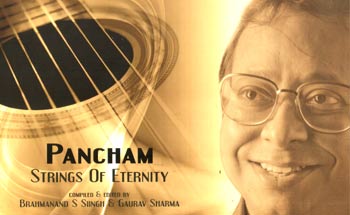Pancham remembered

* A tribute on R D Burman's death anniversary from RadioAndMusic.com
Javed Akhtar has been quoted in Pancham, Strings of Eternity – which is without doubt the best book about �Pancham' RD Burman -- as saying: In every generation there are people who are successful but with time, they lose it and others forget them But there are few people who become successful because they do something which was never done before, and with time their stature keeps on growing This is the hallmark of a great man....
And that is one of the myriad reasons that Pancham's fans are legion.
On the great composer-singer's death anniversary today, RadioAndMusic.com brings music lovers across the world some extracts of heart-warming remembrances of the sheer genius that was RD Burman, from some of the best practitioners of the craft of song, music and lyricism -- people like Asha Bhosle, Gulzar, Manna De, Shiv Kumar Sharma, Javed Akhtar and flautist Pandit Ronu Majumdar
All handpicked from the most definitive and comprehensive tribute in book form, Pancham –Strings of Eternity, to the musical genius. The coffee table book, edited by Brahmanand Singh and Gaurav Sharma, accompanies Pancham Unmixed – the celebrated, multiple-award-winning documentary written and directed by Brahmanand Singh, which celebrates the sheer genius of RD Burman.
Pancham Unmixed is a winner of two National Awards, along with numerous international awards, and the lovingly crafted film and the comprehensive book on Pancham have warmed the cockles of music lovers' hearts. The set is a Shemaroo Entertainment release, and the material extracted here is with permission from Shemaroo.
Read on, for heartfelt tributes to R D Burman aka Pancham – the most remixed music director, the genius whose music Manna De said he liked more than his father Sachinda's; the effervescent music director whom Kishore Kumar called Guru. The man whose music has inspired the greatest awe and admiration.
In his foreword to Pancham – Strings of Eternity, Brahmanand Singh writes: The best part what when I epxerienced some very seasoned people in awe of his musical genius… admiring the khatkas and the murkis and the chalans of his compositions…
Here are some similarly illustrious people pouring their hearts out.
ASHA BHOSLE
Pancham knew how to get the best out from his singers. One needs to learn this art from him. Before the final take of the song, he knew exactly how to boost your morale. Many times he would ask me during the recording, So how is it going? Are you ok?" If I would complain about my voice that day, he would quickly say, lt's our own song, just rehearse, try on the mike and if you can't sing today, we'll do it tomorrow or day after ... don't worry. ...
Unlike other music directors, he would always care to come to the singer's booth and then tell us the subtle things he wanted us to do. Sometimes he would say, This take was good, I will keep it but do you want to give another take for your sake, just the way you want? lt's 99% done but we can add the remaining l% to make it perfect... And that take used to be the best.
Once after I completed the recording, he told me that it seemed there was something in my mind that I wanted to do but was afraid to try. He would encourage me to add that extra bit, do a retake and keep it. And he used to appreciate that extra effort openly. Of course, we also did many difficult songs in just one take like �Nisha' (Sanam Teri Kasam), which I wanted to do again. But he was fully convinced that the first take was perfect. For
Teesri Manzil, the first song recorded was O Haseena, and he approved it in one take. This was the confidence that he had in the artist.
Pancham was very fond of original sounds and experiementations… Once we were going somehwere and there was a village on the way. He bought the typical black flute form there and used it in Namkeen, in which a small kid riding a bull is seen playing it. One day he wanted to record real rainfall sounds and so he went to the Khandala Hotel which is in a corner (of the mountaineous landscape) and recorded the rain sounds the whole night…. For Pyar Mein Dil Pe (Mahaan) he wanted a unique sound which he created by hitting a metallic plate and then dipping it in and out of a bucket full of water to give it that effect…
When I watch TV these days, I see so many youngsters sing his songs. Many of them have a good voice and knowledge, but despite repated hearings they still miss some very fine nuances hwile singing; only we can understand these things. The audience and the judges are happy, but I marvel at how big a music director he was… who composed everything wish such nunaces that these people miss them despite listening to the same song hunderds of times.
GULZAR
Pancham used to say, �You have to nourish a song…'
Pancham used to sing very well and would keep on singing a song for days. It is not enough to compose a song, you have to nourish it, nurture it… you have to cook it', this is what he used to say. I think it is a very big lessong for today's composers. If we would get any idea, coming from either of us, we used to inculcate it without worrying about any rules. Whenever he used to compose, I had to be there.
Once, he (Pancham) was irritated with me during a song that he was doing after 'Mera Kuch Saamaan' (the song which, as the world knows now, he had dismissed saying, 'What do you think ... tomorrow if you bring in a news piece from Times of India I'II compose that as well ...?'). On hearing the lyrics of �Qatra Qatra', he snubbed me for using these words. He wanted softer words like �Boond' (drop) or �Paani' (water). However, when I offered to change the words, he did not allow me to do it. Silently, I watched him do these things because I knew he'II come back full circle and do something exciting always. Suddenly, he told his assistant that it would be interesting if the words �Qatra Qatra' are actually pronounced in a somewhat staccato way to give it its impact. Anything unusual and he was game for it.
Anyway, usually we used to sit together while composing but this time he did not sit with me even as the recording date approached. Whenever I asked him about the time he wanted to sit for the music, he would always postpone it citing that he was busy. I realized something was wrong because even if I told him that I needed to film it as I had dates from the unit, he would simply say you will get it" and brush it aside.
Now during the recording, he left some lines half-way in the track. When I asked him, What are you doing?" he would say, Nothing … you will know later". Then, he would again skip some lines in the recording. If you notice in the song, Ashaji takes an �aIaap' and then comes back to the same line. Post completion, he looked at me and said, Haa, you bring Times of India to compose, now picturize this". Such creative challenge is what we used to work with, the kind of creativity and sharing that is not found everywhere.
PANDIT SHIV KUMAR SHARMA
He was a multi-faceted talent who knew all sorts of music
Our love for the Indian Classical music brought us together. I met Panchamji for the first time in 196 I-62 at his (father's) bungalow, The Jet, when he used to assist Sachinda. We became good friends because of our common interests in the Indian Classical Music.
In the evenings, at around 9 pm post-dinner, Pancham used to pick me up in his Fiat car and we used to go on drives. Or sometimes we used to have kebabs in Lucky Restaurant in Bandra and then move towards the highway for a drive. He always used to play new recordings in the car, be it Siddheshwari Devi, Begum Akhtar or Jazz music. He used to tell me where it would go off-beat or about a particular �sur' in the music. His focus used to be completely on music.
In the earlier part of my musical career, I also used to play the tabIa. He was very fond of rhythm in particular and we got along very well. We used to sometimes listen to Pandit Samta Prasadji�s tabIa recitals. Once Panditji was also invited to their house and he played solo for 2-3 hours for us… Burman dada, Pancham, Basu, Manori, Hariji and I. Pancham had made Samta Prasadji play tabIa in Burman dada's 'Naache Mann Mora'.
No one else could have made me agree to play tabla in Mose Chhal …
At a time when he wanted me to play tabIa for Lataji's Mose Chhal Kiye Jaye (Guide), I had quit playing
the instrument as an accompanist for anyone… in order to focus solely on Santoor. And I dare say that no one else other than Pancham could have made me possibly play tabIa for that song. After the recording Lataji suggested my name to many people for tabIa but I never played for anyone except this one instance.
MANNA DE
I am a greater fan of Pancham than his father's!
In our conversations, Sachinda and I used to discuss Pancham and his music. I used to tell him that we had grown old and that Pancham was too young and hence would play around with notes and beats. In fact I used to tell Sachinda that I liked Pancham's music better than his music. Sachinda used to love Pancham a lot and sometimes used to tell me that, �Manna, you are right. Pancham has a lot of talent in him.'
After composing a tune, he used to work on it for days ...
I was completely drawn to Pancham's way of working. First song that I sang for him was Allah Jaane Main Hoon Kaun' (Pati Patni). In our association, the 30-40 songs that he made me sing, he took very good care while composing each one of them. After composing a tune, he used to work on it for days and that is very praiseworthy. And he also brought his sense of humor in each song. When he made �Ek Chatur Naar' (Padosan), he was hilarious.
Once Pancham called me to inform that the song was ready, so I went to his place, but Kishore was not around. Then Kishore called up at Pancham's place and told me that we should all come to his house as his mother Gauri Devi wanted me to come over for my favorite meal, and I could not say no. So we went there and rehearsed for 5-6 hours. Kishore was such a genius and Pancham was no less. They together injected such marvelous embellishments that the song became a runaway hit. And since I had to sing for Mehmood who was playing a South Indian music teacher, I had to change my accent and singing style completely. When I sang, Pancham came, hugged me and praised my singing. Even in �Gori Tori Painjaniya' (Mehbooba) I could use a lot of classic music nuances and he appreciated the way I sang it.
He also made me sing �Savariya' (Padosan), which I think was a great song. I don't know how he could compose such songs -- Indian classical music-based songs but he could make them sound so light and then people would love them. Rafi and I sang �Nir Tat Dhang' (Chandan Ka Palna) and he gave us long notes, encouraged us to improvise and gave us complete freedom. I am a greater fan of Pancham than his father's! How he could compose a beautiful classical number like Aayo Kahaan Se Ghanshyam (Budhdha Mil Gaya) so easily. In his music room he had a big fish tank, with very rare species and he used to personally take care of them. That is what I loved about him: he took interest in everything that came his way.
He wanted peace when he passed away
It was God's gift, and he was blessed by the Almighty. I will never forget the songs he made me sing. But there was also a time when he had no movie in his hand. Such lows also come to artists. Just before passing away he made me sing for a Bengali movie but I didn't like the songs and told him that. He was disappointed but once he told me, �Dada, I have done very good work for this film 1942 A Love Story, and if it releases at a good time, I will be back to my old days. But before this could happen, he went away. It was a big shock for me and a big loss for the Industry. After he has gone, he is much more popular today. Today everybody is talking about him. I wish Sachinda was here to listen to all this. Wherever he is, may he rest in peace. He wanted peace when he passed away.
RONU MAJUMDAR
As Mehdi Hasan Saab used to talk about everyone having his �mehboob raga' , I think Khamaj was Panchamda's �mehboob' He has used it in many songs, and so beautifully. Both the Burmans (son and the father) had a gift for this �raga' which can be seen in songs like Tere Mere Ki Ye Raina (Abhimaan), Aise To Na Dekho (Teen Devian), Kuchh Toh Log Kahenge (Amar Prem) and Jidhar Dekhoon (Mahaan). In fact he mixed two ragas in Jidhar Dekhoon, with Charukaisi and Antara in Khamaj. In Dilbar Mere' (Satte Pe Satta), whenever Dhaivat is used you get transported into a different world. He could easily meander out of scale like in Sili Hawa (Libaas) but also used to close it in the end; he used to structure his songs in a unique manner, almost like a painting. He also had a great sense of rhythm. Song Joothe Tere Nain (Dil Padosi Hai) has I 7.5 �matras' used beautifully. He would do a lot of changes before the final take; it was all his �upa]' (spontaneous renditions).
Everyone would get inspired by his singing
He used to come to the studio in the morning, and in the huge hall wherein hundreds of musicians could play together, he used to stand at the centre of the hall to play on his harmonium and sing. Everybody used to get their inspiration from there, even before singers used to reach the studios. When he used to sing in rehearsals, directors like Shakti Samanta used to swing to his voice and singers would get conscious since they had to live up to Panchamda's singing.
Once during the recording of 'Khali Haath Shaam Aayi Hai' (ljaazat), I was practicing the song so much that Panchamda understood that I had fallen in love with the �mukhda'; so he just gestured to me indicating that I should pick the �mukhda' when the song ends and therefore you hear a solo towards the end. Now while playing I tried to change it from the way Ashaji had sung, hence you will notice that the rendition is not exactly the way the �mukhda' is. Inspiration for this came from Panchamda's rendition before the recording. I heard it in his voice and took inspiration to go offbeat and play with the tune. This is what live recordings used to do in terms of inspiring a musician.
Kishoreda used to call him Guru
He was also very nice to his singers. If you hear a singer do well, you tend to think that he or she has learnt from Panchamda. Though Panchamda was younger to Kishore Kumar, Kishoreda used to call him guru; on stage Kishoreda told everybody that Panchamda was his Guru, he had taught him how to perform on stage.
He was a king in balancing sounds…
During the recording of �Kuch Na Kaho' (|942 A Love Story), I was not able to get a note in the flute piece at the beginning and asked him for guidance. Panchamda told me that the sound should be as if someone is cajoling a kid; it had sweetness of that kind. So I played it that way but later, there was nothing else for me to play in the song. L told him, Dada, there is no place for me because of the vioIins.... He said, You just go ahead and play. I have my hands on the mixing knobs l will incorporate your flute sound between the violins. It'll find its own place in the song.... Now, how beautifully he accommodated me in the song is beyond words for me to describe. He would encourage right from the side-rhythm players to great classical musicians in his studio. Even now his sounds are fresh and clear. He was a king in balancing sounds. He never believed in any barrier between light and classical music. He said that both were tough and you should know both equally well.
JAVED AKHTAR
Pancham was a sophisticated man… and so was his music
We came together, in terms of songs, during the time of Saagar. I had worked with Pancham as a writer in films like Seeta aur Geeta, Shaan and Sholay when I used to meet him to explain scenes and song situations but my first film as a lyricist with him was Saagar
Our first song together was Jaane Do Na, followed by Saagar Kinaare. For Chehra Hai Ya Chaand Khila Hai for the same film he gave me a tune which I took with me to Khandala to write I wanted to write a flat sort of a line like Yeh Toh Bata Tera Naam Hai Kya, but it could not fit into the meter of his tune The meter would only allow me to write Kya Tera Naam Hai, which I thought was not very dignified So I ignored the tune and wrote a song on my own From Khandala I went straight to his music room as the recording was scheduled sometime in the next 2 days I told him that I had written something of my own and not on the tune given by him He asked me to recite to him, and on hearing it he immediately noted down the song in Bengali (which was his working style) and after a minute of exploring on the harmonium, he composed the complete song!
Pancham had the hallmarks of greatness and of sophistication
In every generation there are people who are successful but with time, they lose it and others forget them But there are few people who become successful because they do something which was never done before, and with time their stature keeps on growing This is the hallmark of a great man.
Today's music has evolved with technology and new trends but If you ask any new composer or singer who their idol is, they readily name R D Burman. His image is growing with time because he was not only successful but he also did something that was never done before. RD Burman brought in a new sound a new rhythm and a new sensibility. If you listen to Teesri Manzil, Chhote Nawab and Bhoot Bungla, you will notice the new sounds and experiments that he conducted. He still rules the hearts of people who understand and know music What he composed was very contemporary (even by today's standards)… far ahead of its time.
I was in Bangalore when he passed away… It was painful to hear about his premature death and I was reminded of an Urdu poet's ironical couplet…
�Ye kis muqaam pe soojhi tujhe bichhadne kee,
Ke ab to jaake kaheen din badalne waale the…'














